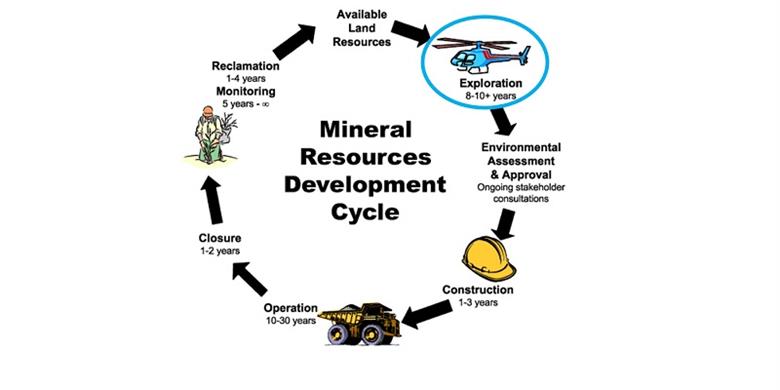Why do we need Mines?
There is an old saying, "If it can't be grown it must be mined." Mining provides all of society's metal needs, as well as the vast majority of material for construction. Mining also provides materials for agriculture, food, cosmetics and many other aspects of modern life.
Does Mineral Exploration always lead to Mine Development?
No. Mineral exploration does not necessarily lead to the discovery of an economic deposit or to the development of a mine. On average across the world, less than one in a thousand exploration projects will be developed into a mine.
Who can explore for minerals in Ireland?
Mineral exploration in Ireland is regulated by the Exploration and Mining Division of the Department of Communications, Climate Action and the Environment. More information about the licensing process is available on their website
What is mineral exploration?
Mineral exploration is the process of investigating the subsurface to ascertain if there are economic quantities of minerals present. In Ireland it must be undertaken in accordance with best practice and respect the environment. It can be undertaken using many different techniques under guidelines published by EMD. Geological Survey of Ireland uses many of these techniques as part of its scientific research into the geology of Ireland, including the national Tellus survey. These can include mapping, geochemical sampling, geophysical surveys and drilling.
What is mapping?
GSI undertakes mapping as part of its statutory obligation to map Ireland's geology. See this page for more details.
What is soil sampling?
GSI undertakes soil sampling as part of several projects. See the soil sampling page for more details.
What is stream sampling?
GSI samples stream sediments and stream water for several different programmes including Tellus and groundwater. See the stream sediments page for more details.
What does a sampling programme look like?
The Tellus project has prepared a set of instructional videos to show how samples are collected and prepared.
What are geophysical surveys?
GSI conducts airborne surveys as part of the Tellus project and ground based surveys within other programmes including groundwater and land mapping. See the geophysical methods page for more details.
What is drilling?
Drilling is the process of obtaining information from below the surface using a large drill rig. This can be done to find out what type of rocks are present, information about groundwater and aquifers, or information about the geothermal gradient. See the drilling page for more details.
Does Geological Survey Ireland explore for minerals?
No. GSI does not explore for minerals. Some of GSI's datasets may be of use to exploration companies, for example, geological maps or Tellus data, but these products are not specifically aimed at the minerals industry and also have environmental, agricultural, health and numerous other applications.
Can I pan for gold myself?
Yes. The Exploration and Mining Division has published guidance on recreational panning including an FAQ.
Does mineral exploration harm the environment?
The Exploration and Mining Division has published reports on whether certain exploration methodologies are likely to have a significant effect on the environment. More on this can be found here.
Do we have mines in Ireland?
Yes, Ireland is home to one of the top ten largest zinc mines in the world in Navan, Co. Meath. In operation since the 1970s it employs approximately 600 people and extends to about 1km depth. Mines at Lisheen and Galmoy closed within the past decade and large volumes of data from those mines are available from the Exploration and Mining Division.
Does blasting take place during mineral exploration?
No, blasting is not used during mineral exploration.
Is cyanide used in mineral exploration?
No, cyanide is not used during mineral exploration.
 Further information on the licensing and regulation of the minerals industry is available on the Exploration and Mining Division's (EMD) website FAQs page.
Further information on the licensing and regulation of the minerals industry is available on the Exploration and Mining Division's (EMD) website FAQs page.